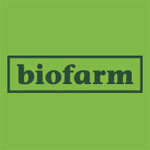Vinegar Apple Vegan Organic, 1l
CHF 4.90
Corresponds to CHF 0.49 / 100 ml
-
Available immediately!7 available immediately
Vinegar Apple Vegan Organic, 1l
Show all products from Biofarm
Vinegar Apple Vegan Organic, 1l
Biofarm Organic Apple Vinegar from swiss origin.Ingredients
Apple cider vinegar, from organic Swiss cultivationAllergy information
Not included : Peanut, Gluten, Milk / lactose, Nuts, Mustard, Sesame, Soy
Nutritional values per 100ml
| Energy value | 71 kJ / 17 kcal | |
| Carbohydrates | 0.7 g |
Product Details
| Guaranteed Shelf Life: | 180 days Keeps for at least half a year after receipt. |
| Filling Quantity | 1 l |
| Chilled product | No |
| Storage | Store in a cool and dry place |
| EAN | 7611631315925 |
| Container size | 6 |
| Origin of the primary ingredients | Schweiz (CH) |
| Origin | Schweiz (CH) |
 Biofarm cooperative - competence since 1972
For over 40 years the Biofarm cooperative promotes the Bud organic farming in Switzerland and offers under the "Biofarm" brand to a wide range of biologically produced products.
Biofarm cooperative - competence since 1972
For over 40 years the Biofarm cooperative promotes the Bud organic farming in Switzerland and offers under the "Biofarm" brand to a wide range of biologically produced products.
History Biofarm cooperative Kleindietwil
The 9 founder of Biofarm cooperative were all students of Biopioniere Hans and Maria Müller. Together with the German doctor Hans-Peter Rusch these had developed the bio-organic farming in the Möschberg above Grosshöchstetten BE and made practicable, together with many farmer families. 1972 Maria Müller had died and Hans Müller getting old, the most even younger maestros saw challenged himself to intervene actively in the further development of this promising farming methods and to invest in them. The time far the most difficult challenge for most organic farmers was the non-toxic weed control. As part of the total use of chemicals in this hitherto very hand laborious work renounced the Agriculture sector to the further development of related cultivators. This prompted some boffins to try an originally arisen in Denmark idea to tackle the weeds with heat. By means of a targeted manner via the germinating weeds out and fed with propane gas flame can be brought to the death. First trials promised success, so that in cooperation with a machine manufacturer, a first series Abflammgeräte went into production. For the distribution of which Biofarm cooperative was founded, being aware of who was elected in agriculture most common legal form. The initiators were no funds available. According restricted were further efforts to develop the farming method. After all, some today effective pulses could be passed on to the practice. As 1974, the Research Institute of Organic Agriculture FiBL began its work, the founder of Biofarm moved gradually from this area back. Meanwhile, a new impulse was brought to the Biofarm. An equivalent next to the farming concern for Maria Müller was the whole food nutrition. Keyword wholemeal bread. As the designer of a domestic mill now the young company approached and offered her his Alsatian flour mill for sale in Switzerland, reaching to the Biofarm, even without suspecting at first that this decision should be leading the way for them. Quick is a great need for these mills was visible. And the families who decided to grind their grain themselves and baked, also laid emphasis on the biological cultivation of the raw material for their daily bread. The turn brought the Biofarm to provide their customers with cereal grains, not least in the idea that a good sales for organic products can motivate reluctant farmers to switch to organic. In collaboration with the Reform Association (brand biona) and the resulting organic food stores across the country range was now rapidly expanding and constantly expanding. Many thousands of women and several dozen men (still!) Have since 1975 Cooking courses of Biofarm visited and so helped to publicize the young company and its products around the country. A few years after its foundation was the Biofarm instrumental in the development and deployment of pan-Swiss guidelines for organic farming and in 1981 at the founding of VSBLO, today Bio Suisse, involved, which still belongs to you today as a member organization. After its founding, the young company moved into first country in the yard their co-founder and first CEO Werner Scheidegger Madiswil. But soon the space were there too tight. 1978 moved the Biofarm the old Sekundarschulhaus in Kleindietwil. Later this could be acquired by purchase and the growing needs of warehouse and office space to be adapted over the years. The range was further enlarged and it raised the question whether the Biofarm to import products which do not grow in Switzerland. Here we have certainly also struggled with the question of whether there could be up to a peasant self-help group for making its own members with imported products competitive. But then we realized that we can sell the local products better if they are part of a larger product range and secondly we had to tell us that it is elsewhere makes sense biologically to do business. The Jacutinga Sugar is a good example: Along with regulators and Emilio Baumgartner (a Swiss Abroad family) and the Bio Suisse, we have developed organic standards for sugar cane cultivation and import Bud whole cane sugar from Brazil to Switzerland. This is also evidence from the pioneering spirit of Biofarm as rediscovery, cultivation and product development and marketing of forgotten cultures in Switzerland as oilseed rape, linseed or mustard.GMO Statement
Organic products are produced without genetic engineering. The use of genetically modified organisms or their derivatives is prohibited in organic farming and processing and contradicts the self-understanding of the organic industry.Available immediately!
7 available immediately


 Delivery Information during the holiday season
Delivery Information during the holiday season










